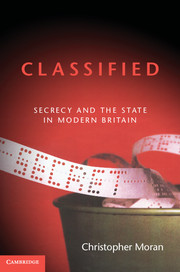Book contents
- Frontmatter
- Contents
- Illustrations
- Foreword
- Acknowledgements
- Abbreviations
- Introduction
- Part I 1889–1945
- Part II Secrecy and the press
- 3 Chapman Pincher: sleuthing the secret state
- 4 Britain's Watergate: the D-Notice Affair and consequences
- 5 Publish and be damned
- Part III Secrecy and political memoirs
- Part IV Intelligence secrets, spy memoirs and official histories
- Notes
- Bibliography
- Index
- Plate section
3 - Chapman Pincher: sleuthing the secret state
Published online by Cambridge University Press: 05 April 2013
- Frontmatter
- Contents
- Illustrations
- Foreword
- Acknowledgements
- Abbreviations
- Introduction
- Part I 1889–1945
- Part II Secrecy and the press
- 3 Chapman Pincher: sleuthing the secret state
- 4 Britain's Watergate: the D-Notice Affair and consequences
- 5 Publish and be damned
- Part III Secrecy and political memoirs
- Part IV Intelligence secrets, spy memoirs and official histories
- Notes
- Bibliography
- Index
- Plate section
Summary
We believe that Mr Chapman Pincher, of whom you have probably heard, will try and get into your Depot to gather certain material for publication. It is most unlikely that he will arrive openly under his own name. To assist your police in recognising him, we enclose a photo. He should not, of course, be admitted and we should be grateful if you would advise us if he appears, giving as much information as you can. Ie. Date and time of ‘visit’, name used, names of any other persons with him or sponsoring him. It is important that this matter should be kept strictly to yourself and your police and they should be warned to this effect. We should be grateful if you destroy this letter when read.
Security officer, Ministry of Supply, early 1950sThe next three chapters of this book consider the extent to which the British press, during the Cold War, promoted the public's ‘right to know’ and rolled back the frontiers of government secrecy. Arguably, when most people think about journalists striving to unearth the secrets of state, they tend to associate that sort of activity with the American media – and with good reason. From the 1960s onwards, the ability to uncover abuses and write about highly sensitive matters became a respected dimension of the US fourth estate, a yardstick by which good journalism was measured. With the First Amendment providing journalists with an extraordinary degree of formal constitutional protection, the American press filed exposé after exposé, serving as a vital check against the unlawful exercise of state power. In his memoir Facing Reality, former CIA officer Cord Meyer referred to a ‘drumfire of editorial denunciation . . . that swept across the country’. High-profile revelations began in 1967 when the muckraking California magazine Ramparts revealed that the CIA had been making secret subsidies to the National Student Association. In 1971, Daniel Ellsberg, a senior military analyst, made headlines around the world when he leaked to the press the Pentagon Papers – the top-secret Department of Defence history of the Vietnam War. President Richard Nixon had asked for restraining orders, only for the Supreme Court to rule otherwise. Not long after this, two young reporters from the Washington Post, Bob Woodward and Carl Bernstein, splashed onto the broadsheets revelations of serious wrongdoing in the White House, including the cover-up of Watergate, the Nixon-inspired burglary of the Democratic Party headquarters in Washington, DC. In their dogged attempt to unravel the scandal, Woodward and Bernstein examined telephone and bank records, followed up each and every lead, and interviewed dozens of officials, including Deep Throat – America's most famous anonymous source. For their part in bringing about the President's downfall, the two men were awarded the Pulitzer Prize. In the years following, journalists such as Seymour Hersh, Jack Nelson and Daniel Schorr achieved national stardom on account of their investigative reporting.
- Type
- Chapter
- Information
- ClassifiedSecrecy and the State in Modern Britain, pp. 95 - 135Publisher: Cambridge University PressPrint publication year: 2012



